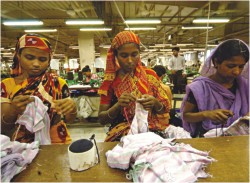|
||||
Education in a competitive world -- Dr S.M.A. Faiz Higher education deficits in a drift -- Abdul Mannan Education for All-Beyond business as usual -- Rasheda K. Choudhury Islamic education heritage -- Dr A.M. Choudhury Economic diplomacy: Awaiting thrust -- Muhammad Zamir A wake-up call -- S. M. Rashed Ahmed Chowdhury New opportunities: New Challenges -- Syed Muazzem Ali Foreign relations: Taking a direction -- Ashfaqur Rahman Indo-Bangla ties: Old shadow, new vista -- C M Shafi Sami Towards a kinder, gentler peacekeeping -- Tazreena Sajjad Independence of the Higher Judiciary -- Asif Nazrul Problems of delay and backlog cases -- Dr. M. Shah Alam Juggling freedom and responsibility -- Shahid Alam Tourism in Bangladesh -- G. M. Quader MP The industrial policy dilemma -- Zahid Hussain 'Consumer redress' and 'empty pocket blues' -- Tureen Afroz How assertive has the Election Commission been? -- Manzoor Hasan Does the Election Commission exercise all its powers? --Mohammad Abu Hena Adivasi's tears and grief -- Sareeta Haider Architecture: How Green is Green? -- Ar. Zebun Nasreen Ahmed Chittagong Hill Tracts: Development without peace -- Naeem Mohaiemen Revisiting the BDR saga -- Brig Gen Shahedul Anam Khan ndc, psc, (Retd) Sexual harassment and our morals police -- Hana Shams Ahmed Garnering efforts is a sign of growing up -- Dr. Nizamuddin Ahmed Rationalising the Intelligence services -- Muhammad Nurul Huda
|
||||
The industrial policy dilemma Zahid Hussain ...................................................
TO do or not to do industrial policy is a question that has been debated in the economics profession endlessly from Hamilton and List to contemporary discussions. The debate is about policies that stimulate certain economic activities and promote structural transformation in the economy. The general case for industrial policy is rather neat: If markets are distorted or incomplete, a competitive market system will fail to allocate resources to socially efficient activities, and this can be corrected by omniscient public intervention. Modern development theory is built on the premise that markets work poorly in developing countries. The market imperfections are ubiquitous and endemic to underdevelopment. It is therefore unreasonable to assume that fundamental structural changes, involving production of new goods with new technologies enabled by the transfer of resources from traditional activities to new ones, will happen on its own. Markets have too often failed to supply new technological knowledge about products and processes because of externalities generated by innovators and the coordination failures across different input markets. Innovators incur the cost of finding out whether something is profitable or not. If she succeeds, the copycats free ride and enter. However, she bears the entire loss in case of failure. This causes a divergence between private and social return making market incentives for self discovery very weak. Further, when return to one investment depends on some other investments, there may not be a way for the market to coordinate both investments and consequently no private investor will invest in either. Economic growth is a process of continuous technological innovation and industrial upgrading. Among others, successful upgrading requires that the producers in the economy overcome issues of limited information regarding which industries are viable; coordinate related investments by other producers; and appropriate the benefits of information externalities arising from knowledge of pioneer firms' success. Left on its own, free markets may not be able to resolve the information, externality and coordination problems. Thus, in addition to playing a proactive role in the improvements of hard and soft infrastructures, purposive action from the state is needed to overcome the market failures that obstruct the process of structural transformation. Paradoxically, the theoretical case for industrial policy and the practical case against it are both water-tight. The information and incentive problems are not unique to markets; they plague the state as well. It is hard for governments to identify with any degree of precision and certainty the relevant firms, sectors, or markets that are subject to failures -- governments simply cannot pick winners. When they try to do so, they end up inviting corruption and rent seeking. One would think empirical evidence can in principle settle the issue, but they have not been informative enough to be convincing either way because of a variety of conceptual issues arising primarily from the lack of an explicit counterfactual. So, where do we go from here? The following observation by Justin Lin, Chief Economist of the World Bank, is germane in this context: "Governments have adopted a variety of measures to promote industrialization and technological upgrading, with a wide variety of results. Used well, the unique powers available to governments can be wielded to initiate and support long-run sustained improvements in factors and productivity. Our central task as development economist is to learn from these historical examples, as well as from economic theory and empirics…"
Indeed, while economists continue to debate whether or not industrial policy is desirable, most governments have been indulging in industrial policy even though they may not necessarily call it so. Export subsidies, free trade zones, special economic zones, industrial estates, trade protection, subsidized and directed credit, tax incentives, and public ownership are all industrial policies in different guises. The relevant question therefore is not whether industrial policy works, the relevant question is under what institutional arrangement it stands the best chance of working. Bangladesh government is currently finalizing its new industrial policy. How best can it make sure that it makes a positive contribution to Bangladesh's industrial development? The literature documents a number of concerns about the likely shortcomings of industrial policy in practice. While the specifics of industrial policy depend critically on the local institutional capabilities and circumstances, there are some general principles articulated by Dani Rodrik that are helpful: First, the policy must recognize that governments lack omniscience. The policy design then has to be such as to elicit information about the constraints markets face through strategic collaboration and coordination between the government and the private sector. There has to be an institutional mechanism for uncovering where the bottlenecks are and what interventions in that context are most likely to work. In addition, there has to be periodic evaluation of the outcomes in order to learn from mistakes being made in the process. Second, it must have both carrot and stick -- carrot to encourage investments in nontraditional areas and stick to weed out projects that fail. A major lacuna in Bangladesh's past industrial policies has been the notable absence of the discipline of the market to bear on the market as manifested in the so called "sick industries" phenomena. As Rodrik argues: "The appropriate question … is not whether a government can always pick winners -- it shouldn't even try -- but whether it has the capacity to let the losers go." The trick is to have mechanisms for detecting failures and phasing them out. Third, the policy apparatus must be responsive to the ultimate "principal" -- the general public. This not only gives legitimacy to the policy but also keeps the relevant bureaucracy honest. Actual and potential government assistance given to existing firms and new entrants should be public information as should be the government-business dialogs. Of course there is always the possibility of government failure, but that can not deter the state from attempting to do what markets don't. However, the latter should not be taken as a foregone conclusion. There are many instances of successful industrial development based on domestic and foreign responses to perceived opportunities. The Hsinchu Science Park in Taiwan and the Special Economic Zones in China are cases in point. The initiating force in the Indian software sector and the garment sector in Bangladesh was also private with the government playing a supportive role after these sectors took off. The author is Senior Economist at the World Bank Dhaka office. The views expressed are the author's own, not that of the World Bank. |
||||
© thedailystar.net, 2010. All Rights Reserved |


